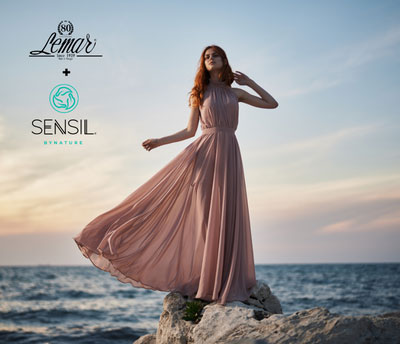INTERVIEW: Manuela Araújo – Lemar’s Ceo
Nilit
A family-oriented business has been transforming the textile industry in Europe for more than 80 years. We are talking about Lemar, which is derived from its founder’s name: Leandro Magalhães D’Araújo, the grandfather of CEO Manuela Araújo. We had an amazing and insightful Q&A with Manuela about top-quality products, sustainability, the future of the textile industry and much more!
In this article, we are invited by the head of the Portuguese family-owned business to think about what is necessary for a company to become a leader in the international textile industry. Manuela Araújo, Lemar’s CEO, shares how she values the core principles her grandad established when starting this dream business, overcoming challenges and innovating with passion and purpose.
Manuela highlights their achievements over the years and the importance of being the change you want to see in the world. One important principle that drives the Lemar business is to install high quality standards in producing fabrics for the textile industry, changing it for the better. That is the spirit that sustains a great company for several generations. Through focusing on continuous innovation, progressive thinking, and a creative approach, this Q&A leaves us with essential insights to shape our perspective to face such challenges and seize opportunities the right way.
Enjoy Manuela’s words!
Since 1939, Lemar has been an absolute reference in the European and international textile industry. Based in the renowned district of Guimarães, Portugal, today the company produces fabrics for the world’s most important brands. What have been the most important milestones in your history?
Manuela: We have indeed had some amazing achievements over these eight decades. Essentially, I stress the time when we realized we would have to change our business strategy if we wanted to export our fabrics. For being competitive and our products being attractive, it was mandatory to be innovative. We changed our production layout with better and more versatile looms, which allowed us to improve our weaving quality and to develop new articles. We started to go to fabric fairs and visit customers, collecting all possible data. New ideas opened new doors. We had the chance to work with local sales agents who helped us to become who we are today. Some of them are still working with us! However, the most important milestone of all is the fact that the 4th family generation is still carrying on the values of the company, investing in our principles, in our people and processes. This is what my father and grandfather did and this is what we continue to do.
The company’s main focus is the production of fabrics for swimwear. In recent years new lifestyles have radically changed the way people dress and the range of end targets has expanded. This has allowed the creation of many different and varied qualities of fabrics. The fluidity of contemporary fashion has opened up new avenues for Lemar fabrics. Are there new territories to explore?
Manuela: In today’s digital, multi-channel, highly personalized world, consumers are spending less and are more selective with their purchases. The current complexity of Europe’s political environment turned the buyer’s journey more money-conscious, looking for quality rather than quantity, suitable functionality for a reasonable price and more than ever environmentally friendly! Since fashion is a universal concept, we need to understand and respect the individuality of today’s consumers if we wish to reach them. We must keep adapting ourselves according to these new dynamics if we want to find such territories to explore. One of the main advantages of our fabrics is that they can be used for several end uses. Recently we have the case of the very same fabric reference being used in jackets by a well-known brand in Germany, in swim shorts by a Swedish company, in caps and hats in Norway and more impressively for dog leashes in Finland!
In your view, what are the most relevant changes that the fashion industry is going through?
Manuela: The global economy is facing unparalleled supply chain volatility in recent memory. Raw materials, energy, operating and transportation costs have more than tripled in the last couple of months, and it seems this never-ending price fluctuation has not come to an end! And beyond prices, the very availability of certain raw materials, and finishing containers remains very uncertain for the coming weeks and months This has caused an increased complexity in Lemar’s ability to keep the production costs valid for a longer period and to plan deliveries properly. We are working to mitigate the impact of this unprecedented situation, and we truly understand how it affects our customers. But honestly speaking, I do not know how long we can bear such extra costs!
Over the past decade, the demand for sustainable textiles has grown vertically opening up new spaces for greenwashing as well. How does a textile company like Lemar address the issue of ethics and sustainability?
Manuela: First, I would like to say that all our fabrics are made in Portugal in our mill in Guimarães, 40 kms northern from Porto. As a European company, Lemar operates under EU directives and regulations regarding social and labor responsibilities. Our products comply with all applicable legal requirements and regulations in effect, including those relating to: quality, security, labor and employment legislation; international conventions on child rights; and ethical behavior and environmental legislation. We all know that ethical fashion and sustainability are becoming hot topics globally, and transparency plays an important role in terms of the above-mentioned issues. Choosing fabrics woven in countries with higher wages, stricter environmental laws, and better labor safeguards is definitely more sustainable. It is not exactly rocket science but you will pay more for eco fabrics than for fast fashion options…but we all know that fast fashion has high environmental costs that don’t show up in the price. Aren’t we all paying the price to produce such an inexpensive material? The more we demand ethically made sustainable options, the more the supply chain delivers a clear, positive impact for workers, consumers and for the planet.
True sustainability leaves no room for ambiguity. For many years Lemar and Nilit have been partnering for the development of exceptional high quality fabrics using SENSIL® premium Nylon 6.6, a collection of innovative and sustainable yarns, each with its own technology and consumer benefits. How important is it to combine technology with sustainability in the current historical moment?
Manuela: Every day, new cool solutions to reduce textile environmental impact are emerging within the industry. As you are aware, we work mostly with synthetic fibers (polyester and nylon). Our core business is swimwear and swim shorts fabrics woven with these fibers. We know such fabrics may not have the level of sustainability that we wish they had, but, thanks to technology, there have been so many yarn innovations that sustainability no longer has to compromise styling. One of them is upcycling, the process of transforming byproducts, waste materials, and useless or unwanted products into new yarns of high quality and environmental value. By choosing these options, we give a second life to a material that would end up in a landfill or the ocean for good. On the other hand, innovative production processes have contributed to a significant reduction in CO2 emissions that affect global warming, while ensuring enormous water and energy savings.
Lemar has recently adopted SENSIL® BioCare and ByNature. Can you tell us about future plans with these two premium sustainable fibers?
Manuela: When we develop our fabrics, we are concerned with the entire production chain. Naturally, it begins by choosing the yarn that will be used. The goal is to keep our high-quality standards, as well as to reduce the environmental impact as a whole. That’s why among our range, you are able to find several value-added fabrics offering advantages across all areas of sustainability. Thanks to their pioneering identity, these two SENSIL® options will bring a dynamic and unique identity which will strengthen our mutual interest in building a better planet.
<< BACK TO SENSIL Blog












